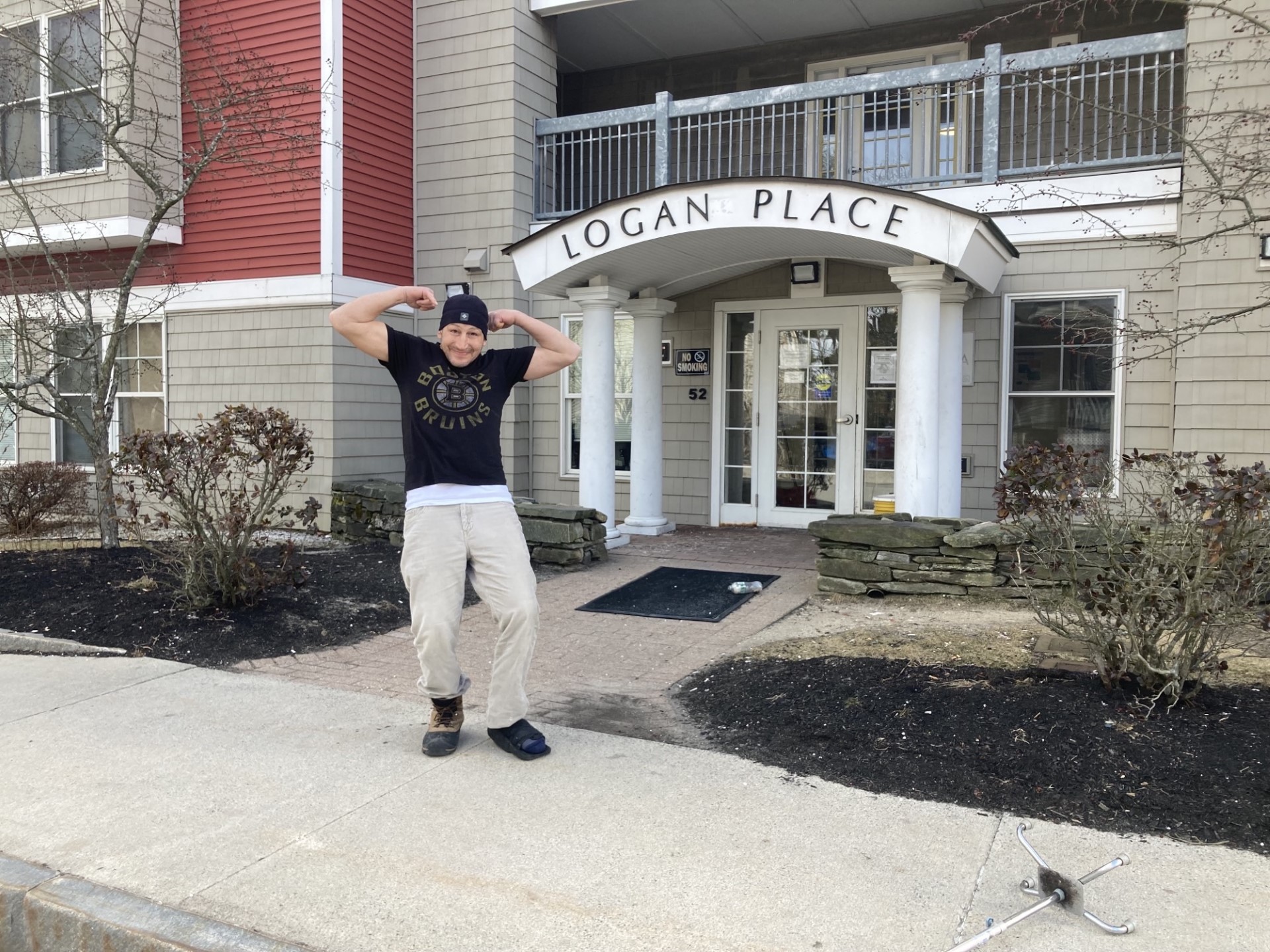For 14 years, Kabir was homeless in Portland. But today, he is safely housed at Logan Place, Maine’s first Site-based Housing First program which opened 19 years ago.
Kabir’s time on the streets was tough. “There is no break when you’re homeless. There’s no door to close,” he shared. Living outside led to numerous health issues and landed him at Maine Medical Center.
“I was hospitalized three times this year before I made it through to recuperative care and to this apartment. It gave me a place to heal and do other treatments. I feel like I’ve been given a clean slate and a whole new chance at life. It’s my doctor, it’s people like Dr. Rob [Fulton, Medical Director, Greater Portland Health, who provides leadership at the recuperative care site] and Britt [La Shier, Preble Street, Director of Social Services, Recuperative Care Program], it’s people that are there for me.”
A partnership between Maine Medical Center, Greater Portland Health, and Preble Street, Portland’s innovative recuperative care program provides a space for people experiencing homelessness to rest, heal, and connect with medical care and social work providers after being released from a hospital stay. The 15-bed program serves people with acute medical needs and most stays last approximately 4-6 weeks. In today’s housing crisis this is often not enough time to get someone into housing, but it is enough time to lay the foundation toward long-term stability and eventually a permanent home.
When Kabir entered recuperative care, he was already on the waiting list for one of Portland’s 85 existing Housing First apartments. The waiting list for this permanent housing is typically more than 100 people at any given time.
“All of us have a time when we needed another chance and that’s what recuperative care offered me,” adds Kabir.
Britt La Shier has known Kabir for several years. “Sometimes when folks are outside for so long, you are genuinely excited to see people in the hospital to get the treatment that they deserve or connected services.”
“I think a lot of people think that once a person is in Housing First that the job is done. But that’s really where the work begins – to get people medically stable or addressing a mental health or substance use disorder. With Kabir transitioning from recuperative care directly into Logan Place, he’s in a much healthier state than he was before and can benefit more from these first few weeks of housing.”
“Here at Logan Place, I’ve finally reached a place where I can live quietly and figure out how to reach more people to help – there’s a great need to help these people that are dropping into oblivion at an insane rate,” shares Kabir.
Avesta Housing and Preble Street collaborated on the first three Site-based Housing First properties in the state of Maine — Logan Place, which opened in 2005; Florence House (2010); and Huston Commons (2017). Avesta owns and operates the properties, and Preble Street provides 24/7 onsite support services, harm reduction, and crisis intervention to maximize housing stability and prevent returns to homelessness. Portland Housing Authority issues project-based Section 8 vouchers that are attached to every unit. In November 2023, thanks to legislation signed into law this year by Governor Mills to create a sustainable vehicle to develop Site-based Housing First programs across Maine, Avesta and Preble Street announced plans to provide for a fourth Site-based Housing First permanent housing on the site of the former Oxford Street homeless shelter in Portland.
“Housing is healthcare,” shares La Shier. “The more housing opportunities – whether into a substance use program or to transitional housing or permanent housing like Site-based Housing First – that we have paired with medical respite, the longer that people can have an extended life and a happier and healthier quality of life as well.”
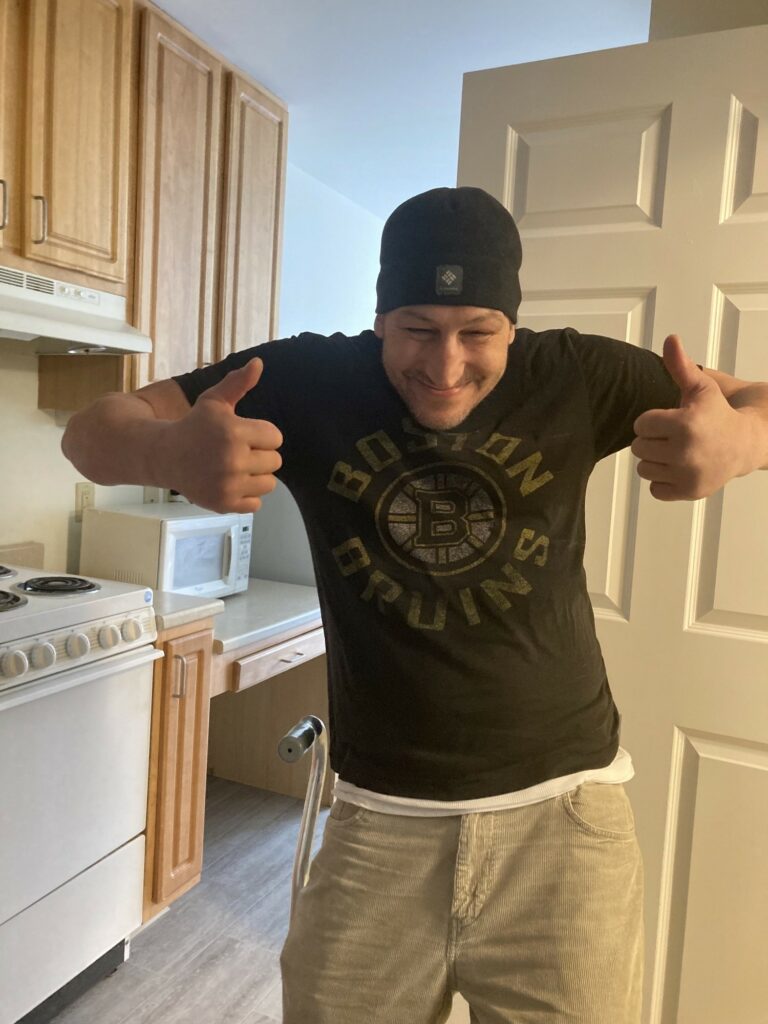
“I feel great about the future. I’m grateful to have a platform to speak and maybe get through to somebody. I want to reach out and do peer support; I want to be able to give back.”
Learn more

Preble Street testimony in support of permanent, sustainable funding for Maine emergency shelters
Maine needs and deserves safe, accessible, professionally run, and sustainable emergency shelters that can meet the needs of the growing number of individuals and families experiencing homelessness in our state. On Tuesday, February 10, 2026, shelter executive directors and staff from across the state went to Augusta to advocate for a sustainable funding source that

Federal government decimates funding to housing programs
As we shared earlier this month, there will soon be more tents and encampments popping up throughout Maine. In a continuation of massive cuts to programs helping people living in poverty, the current Administration has announced a huge change to how it will fund housing and homeless services. This new approach will decimate permanent supportive
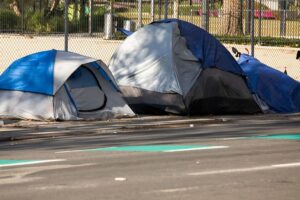
1,200 Mainers at risk of reentering homelessness
CALL TO ACTION Call and email Senators Collins and King, and Representatives Golden and Pingree as often as you can — every day — and implore them to demand that the Department of Housing and Urban Development (HUD) revise their disastrous changes to federal homelessness and housing policy. If they do not, more than 1,200
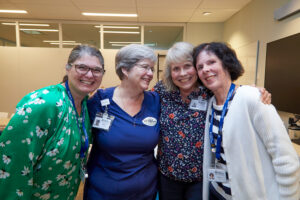
Compassionate end-of-life care for unhoused individuals
Preble Street’s work is never done in isolation. We are continuously making connections with other social service providers and nonprofits to better serve clients and the needs of the community. This month, we are highlighting a special partner of several of our programs, Hospice of Southern Maine. Hospice of Southern Maine (HSM) works to ensure

Federal attacks on people in poverty
Instead of providing solutions to hunger, homelessness, and poverty, an onslaught of recent federal actions and policies are attacking the people suffering from these challenges. The massive cuts to food assistance (SNAP), Medicaid, and homeless prevention and housing programs are harming thousands of Mainers, including older adults, people with disabilities, Veterans, families, homeless youth and
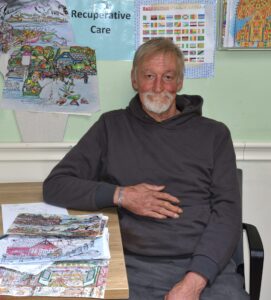
Brian’s Story
Sitting at a table at the Recuperative Care Program (RCP), Brian lays out pages of his art. “I’m working on making a children’s coloring book,” he says. Most of the pieces he has laid out are of captivating coastal scenes featuring birds, boats, and buoys. The longer you look at each page, the more you’ll
